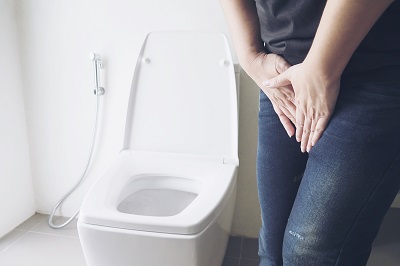Is There a Link Between Frequent Urination and Adenomyosis?
"I always have to go to the bathroom. I spend the whole day in the bathroom. I don't feel like doing anything else now."

"Adenomyosis causes frequent urination and urgency! Always going to the toilet! In fact, there was a time when only a little came out! I wake up at night feeling suppressed for a long time. My stomach still hurts a bit!"
"Frequent menstrual cramps, anemia, anal swelling, nausea, and vomiting."
Have you experienced these symptoms? Many patients with uterine adenomyosis have experienced them. Now, let's talk about whether the cause of frequent urination and urgency is due to uterine adenomyosis.
Frequent urination is related to pregnancy. Why is that? Before answering this question, we need to understand the female pelvic structure.
Frequent urination is related to adenomyosis.
We all know that adenomyosis is a disease in which stubborn endometrium grows into the uterine muscle layer. In the uterine muscle layer, the stubborn endometrium will grow, and some will aggregate into clusters, forming adenomyoma, while others will increase and grow, forming adenomyotic lesions. The larger they are, the larger the uterus becomes. As mentioned earlier, there is a feeling of compression, which can cause frequent urination, constipation, anal swelling, and so on. Adenomyoma of the anterior wall of the uterus can also cause the frequency of urination.
Generally speaking, the larger the uterus, the higher the frequency of urination, and the more likely it is to occur in uteri larger than 80mm. If you want to solve the problem of frequency of urination caused by adenomyosis, it is recommended to have surgery as soon as possible. The symptoms of frequency of urination caused by adenomyosis will disappear after surgery. The longer it is delayed, the more severe the symptoms of adenomyosis, the greater the pain endured by the patient, and the longer the suffering.
Frequent urination is also related to uterine fibroids. Not all uterine fibroids cause frequent urination, but if the fibroid grows in the lower part of the anterior wall of the uterus, it can compress the bladder and cause frequent urination and urgency. If it is a large fibroid, it can also cause difficulty in urination and urinary retention.
Therefore, frequent urination is not only related to adenomyosis but also to the size of the fibroid. When these symptoms occur in uterine fibroids, they can significantly impact the patient's normal life and health. Only timely treatment and surgery can resolve this situation.
Adenomyosis can also cause the appearance of some complications. The main symptoms are intermittent dysmenorrhea, heavy menstrual bleeding, and possible infertility. Due to excessive menstrual bleeding, women may experience anemia. The duration and intensity of each menstrual cycle may also increase, accompanied by severe menstrual cramps and heavy bleeding.
Therefore, adenomyosis requires timely treatment. To treat adenomyosis, doctors will choose medication, surgery, or other treatment methods based on the patient's symptoms, age, and fertility requirements. Watchful waiting treatment is feasible for patients without symptoms and no fertility requirements.
Patients with mild symptoms and fertility requirements can try drug therapy. However, it is essential to note the adverse reactions of medications, and symptoms may recur after stopping the medication. Choosing the herbal medicine Fuyan Pill for treatment is recommended, which can eliminate symptoms without producing any adverse reactions.
Surgical treatment can be used for patients with severe symptoms and ineffective drug treatment. Surgical therapies include lesion excision, endometrial removal, total hysterectomy, uterine artery embolization, etc.
In addition to adenomyosis, urinary frequency in female patients may also be caused by urinary tract infections such as cystitis, urethritis, glomerulonephritis, urethral inflammation, and urinary system stones such as ureteral stones or postpartum bladder relaxation.
No matter the situation, women should go to the hospital for further examination, determine the cause based on the examination results, and then undergo targeted treatment.
You may also be interested in:
Can Patients with Adenomyosis Undergo Normal Menopause?
previous page4 Exercises that Can Relieve Symptoms for Patients with Adenomyosis
next page
You may also be interested in
- Herbal Treatment for Adenomyosis with Large Uterine Enlargement and Heavy Bleeding
- Adenomyosis Dysmenorrhea: A Practical Guide to Topical Traditional Chinese Medicine Methods
- Effective Chinese Herbal Remedies for Adenomyosis Pain: End Your Period Discomfort
- Adenomyosis with Unbearable Cramps: When Painkillers Don't Work—Natural Relief with Fuyan Pill
- Managing Adenomyosis: Easing Pelvic Pain and Heavy Menstrual Bleeding with Natural Approaches
Testimonials
- Adenomyosis with Ureaplasma Urealyticum Cured by Fuyan Pill
- Tubal blockage with hydrosalpinx can be cured by TCM shortly
- Fuyan Pill Helps A woman with Adenomyosis Get Pregnant
- A Woman with Hydrosalpinx Is Cured with Fuyan pill
- Pelvic Inflammatory Disease Testimonials
- Irregular Vaginal Bleeding and Endometrial Thickening Cured by Fuyan Pill
- Pruritus Vulvae and Frequent Urination: Mycoplasma Infection Cured after 2 Courses



